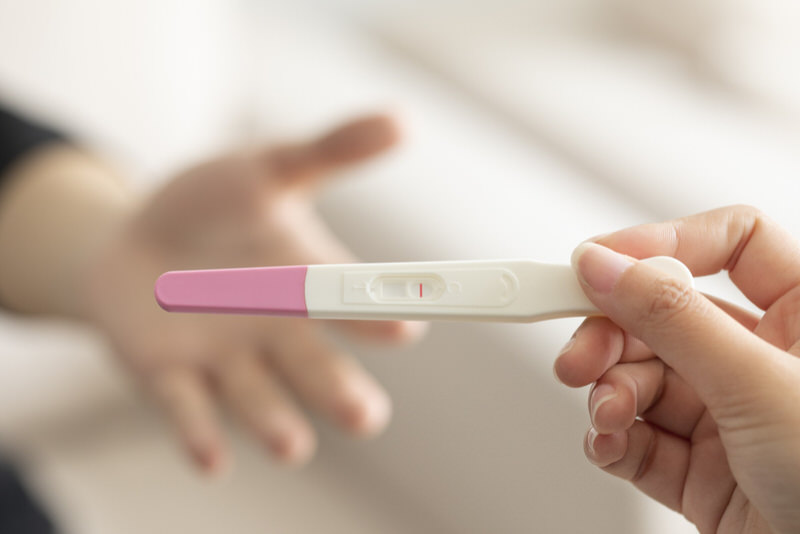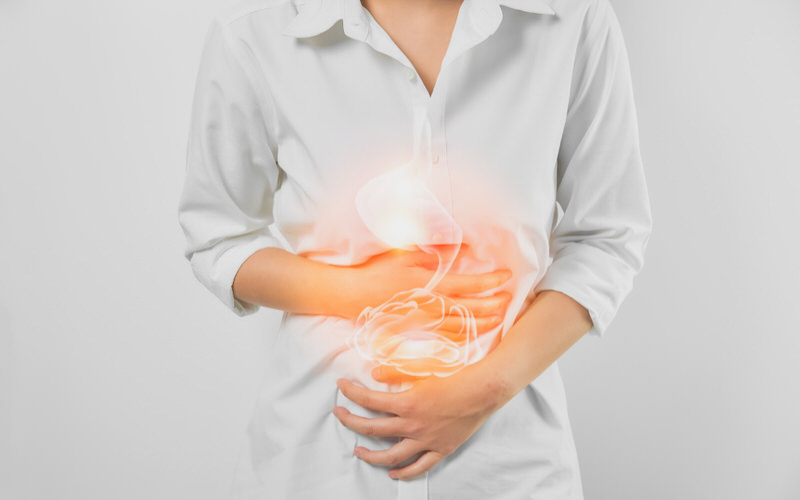If you feel something is moving in your stomach, it could be a cryptic pregnancy, phantom kicks, or ovulation period creating a false sensation. Other issues could be at fault, including digestion, indigestion, muscle spasm, allergic reaction, intestinal obstruction, or diverticulitis. These issues can be diagnosed from other symptoms besides a sensation of movement and treated accordingly.
The stomach is a muscular organ located between the esophagus and the small intestine. So, lately, if you’ve been noticing a strange sensation of something moving in your stomach, it could be something that’s troubling your lower abdomen or even a cryptic pregnancy.
You can feel any problem in the organs in your stomach too.
Sometimes we confuse a sensation in our lower abdomen as something wrong with our stomach. Other times it could be your ovulation time.
Various reasons might be creating this sensation of something moving in your stomach. Let’s take a look into what it could be and the medical advice you should be taking!
Lower abdomen issues
Most of the time, when you feel a sensation in your stomach of something moving around, it’s caused by issues that generate in your lower abdomen. It can create a false sense of movement in your stomach.
The lower abdomen is between the chest and the pelvis. It contains organs involved in digestion, such as the intestines and the liver.
The lower right portion of the abdomen includes a part of the colon and the right ovary in women.
What causes movement in a woman’s stomach?
1. Pregnancy
One primary reason why there’s a sensation of something moving around in your stomach could be because you might be pregnant. It’s quite a new sensation for first-time moms, so it might be hard to recognize it as a pregnancy first.
The sensations increase as your baby grows, and the new mother can feel them. Usually, women feel the baby’s movement in their second trimester (between 16-25 weeks). During this time, women might feel a fluttery sensation.
These sensations only increase with time until you feel the baby kicking and can include a baby hiccupping, stretching limbs, turning over, or flexing.
2. Stealth or cryptic pregnancy

It becomes a different case altogether when women do pregnancy tests at home to determine if they’re pregnant or not, and it comes as negative even though they’re pregnant.
It’s known as stealth or cryptic pregnancy, which conventional medical testing methods may fail to detect.
It can be scary for women who don’t want any more children. Other symptoms of pregnancy include:
- Having tender and swollen breasts
- Mood swings
- Fatigue
- Nausea
Usually, someone misses out on being sure about their pregnancy if they’ve fluctuating hormones. Suffering from infrequent periods is a significant reason why women believe they couldn’t possibly be pregnant.
Cryptic pregnancy can occur even if you suffer from conditions including PCOS, or perimenopause, are on birth control pills, recently came out of pregnancy, and have low body fat.
If you think you have a cryptic pregnancy, discussing possible outcomes with your doctor and seeking professional medical advice is the best solution.
Remember, it’s your body, and you know your symptoms best.
3. Ovulation and periods
When their periods are nearing, some people can feel many different sensations in their lower abdomen, affecting their stomach. Sometimes it might feel like the issue is with your stomach, as muscle cramping is common.
Some people might also feel their muscle squeezes as their ovaries prepare themselves to start the process of releasing the egg.
For some, it might not even be noticeable, and they don’t feel anything significant.
Still, depending on your body, you might feel an abdominal movement if you’re nearing your period.
During your menstrual cycle, cramping is a common symptom but taking a pain reliever helps many women.
4. Phantom kicks
Phantom kicks are a false sensation that mothers get after their childbirth.
There is the continued perception of fatal movement in the abdomen, which can be in many ways like light, quickening movements. You might feel this for days, weeks, or even months to come after your pregnancy.
Those who have suffered from miscarriage or abortion might also feel these sensations in their stomach. You might even feel them after years of childbirth.
Some possible reasons for getting phantom kicks could be:
- During pregnancy, the stretching of the urine cavity or abdomen increases the growth of nerve receptors. So the nerves in your stomach are on auto-pilot, giving you a false sensation of carrying a baby and feeling abdominal movements.
- Another reason could be the mother suffering from a mental health disorder.
- Many women also suffer from postpartum depression, which in itself could be very brutal with different experiences for every woman. Their body, as well as their mental state, suffers a lot. Phantom kicks could be another false issue for such women.
- A pregnant woman might develop a heightened awareness of fetal movement during her pregnancy. While it’s good during pregnancy but after childbirth, your body can confuse it with other body functions. You might be having gas can be confused with the kicking of your baby.
Other causes of movement in the stomach

Different body functions could be causing such a sensation. Let’s try to understand each of them and learn the treatments your healthcare provider can make available for you.
Digestion
The digestion process involves your esophagus, stomach, small and large intestine, and finally, rectum.
So, as you eat anything, it travels down your esophagus to your stomach, where it’s mixed with digestive juices and travels down to your small intestine.
This whole process involves muscles that you can feel and makes you feel something is moving in your stomach.
Indigestion
If digestion can cause a sensation, so can the opposite of it, that is indigestion.
Indigestion brings many symptoms, making it easier to identify if what you’re suffering from is indigestion.
It causes:
- Heartburn
- Nausea
- Stomach pain
- Bloating
- Vomiting
When having indigestion, you will feel abdominal pain. You might get a muscle cramp while moving around, and it creates a sensation of something moving around in your stomach.
You can avoid indigestion by making some healthy lifestyle choices, living a stress-free life, and getting enough sleep and water in your body.
Muscle spasms
Muscle spasms can be defined as painful contractions and tightening of your muscles. It can occur on any part of your body, most frequently in the legs, including the lower abdomen. They’re involuntary and unpredictable.
They can either be mild or severe. If severe, you would automatically be aware of it, but you might not identify the mild issue.
One way to tell if you’ve muscle spasms is to touch the area where you feel the sensation of movement. Your muscles will be visibly more rigid than usual or appear distorted.
They can be caused due to various reasons but can be treated by stretching, massaging the area, using hot or cold packs, hydrating yourself, or medicines, to name a few. If it’s severe, seek medical advice.
Allergic reaction
Sometimes a sensation of something moving in your stomach can also be felt when you have an allergic reaction.
If you accidentally end up consuming something you’re allergic to, it can mess up your stomach and the whole digestive tract.
Most commonly occurring when people allergic to gluten end up consuming it.
Other symptoms include:
- Abdominal bloating or pain
- Persistent diarrhea
- Constipation
- Vomiting
- Weight loss
Your stomach is distressed after something like this and can rumble, twist, and turn, get the urge to vomit, remain upset, or get cramps to define a few sensations you might feel.
Intestinal obstruction
Intestinal obstruction is a gastrointestinal condition when a blockage keeps food or liquid from going through your small intestine or large intestine.
It affects your lower abdomen by causing pain and muscles to contract. There’s a visible swelling of the stomach if your look carefully.
Other symptoms include:
- Loss of appetite
- Constipation
- Vomiting
- Inability to have a bowel movement or pass gas
Treatment will vary based on the severity and cause of your condition but generally requires hospitalization.
Diverticulitis
Diverticulitis is an inflammation or infection in one or more small pouches in the digestive tract. These pouches generally aren’t harmful but can show up anywhere in your intestines.
It might not even be visible to some, but the most common symptom is getting cramps on the left side of your abdomen.
Your lower abdomen might feel tender to touch which makes it feel like a sensation of movement in your stomach.
Other symptoms include:
- Constipation
- Diarrhea
- Bloating
- Belly pain
For the treatment, patients have suggested rest and a liquid diet so the intestines can heal quickly. Avoid foods like dry fruits, popcorn, corn-like foods, and pickles (to name a few) that can affect your process of recovery.
For severe cases, your doctor might recommend hospitalization or antibiotics. It might even require surgery in highly severe cases and becomes a medical emergency.
FAQs
Why do I feel something tickling in my stomach?
If you’ve got a feeling of something tickling in your stomach, it might be due to the issues like food allergies, intolerances, and associated autoimmune conditions. They might be causing a churning sensation in your stomach or intestines because your body cannot tolerate the issues.
Why do I feel something hard moving in my stomach?
If you feel yours is hard to touch accompanied by swelling, it might be caused by overeating or drinking carbonated drinks. Another serious issue could be inflammatory bowel disease.
What causes lower abdominal pain in females?
Period cramps are the most common issue that most females bear every month, but other issues they might face could be gas, inflammation, infection, indigestion, or endometriosis. Other issues causing abdominal pain could be trauma, such as hernias or shingles.
Can food allergies cause stomach inflammation?
People suffering from a food allergy often have inflamed stomach and swelling, weight problems, digestive issues, aches and pains, and more.
To summarize
Pregnancy could be a significant reason for these sensations of movement in the stomach, but other issues are involved.
At the same time, most of the other problems related to pregnancy might be unheard of, like cryptic pregnancy and phantom kicks. They’re pretty natural conditions that women suffer from but aren’t talked about more often.
There are other common issues that one faces in their day-to-day lives and can be pretty easy to confuse with movement in your stomach.
It becomes easier to identify what could be causing such a sensation if you pay attention to your symptoms. Then it also becomes easy to treat your issue, which can stop such a feeling of movement in your stomach.


